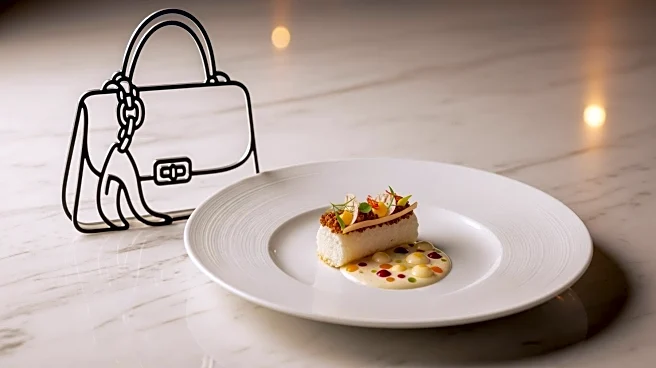What's Happening?
Luxury fashion brands are increasingly integrating culinary experiences into their retail spaces to enhance customer engagement. This trend is exemplified by the restaurant and café housed in the Louis Vuitton flagship in Milan, developed in partnership with Da Vittorio, a three-Michelin star restaurant. The initiative is part of a broader movement where fashion brands collaborate with food and beverage players to create unique experiences for consumers. The Fashion Loves Food gala hosted by WWD highlighted this cross-industry collaboration, showcasing how fashion brands are leveraging food to deepen their connection with customers. Quintosapore, a pioneering farming project in Italy, is also drawing parallels between couture fashion and agriculture,
emphasizing quality and storytelling in both industries.
Why It's Important?
The integration of culinary experiences by luxury fashion brands signifies a shift towards creating holistic and memorable customer experiences. This approach not only enhances brand loyalty but also attracts a diverse clientele interested in both fashion and gastronomy. By collaborating with renowned culinary establishments, fashion brands can offer exclusive experiences that differentiate them from competitors. This trend reflects a broader strategy to engage consumers on multiple levels, fostering a deeper emotional connection with the brand. Additionally, initiatives like Quintosapore highlight the importance of quality and sustainability, aligning with consumer demand for ethically produced goods. This cross-industry collaboration could lead to innovative business models and partnerships, benefiting both the fashion and food sectors.
What's Next?
As luxury fashion brands continue to explore culinary collaborations, we can expect more innovative partnerships and experiential offerings in retail spaces. These initiatives may expand beyond flagship stores to include pop-up events and exclusive dining experiences in various locations. Brands might also explore collaborations with local chefs and food producers to create region-specific experiences. The focus on quality and sustainability will likely drive further innovation in both industries, with brands seeking to enhance their offerings through unique storytelling and engagement strategies. This trend could also influence other sectors, encouraging businesses to adopt similar approaches to enhance customer loyalty and brand differentiation.
Beyond the Headlines
The integration of culinary experiences into fashion retail spaces raises interesting questions about the future of consumer engagement. As brands blur the lines between different industries, they may face challenges in maintaining authenticity and quality. The emphasis on storytelling and experience could lead to a reevaluation of traditional marketing strategies, with brands focusing more on creating emotional connections with consumers. Additionally, the collaboration between fashion and food industries highlights the potential for cross-industry innovation, where businesses can learn from each other's practices to enhance their offerings. This trend may also influence consumer expectations, with customers seeking more immersive and meaningful experiences from brands.

















